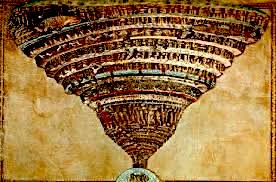Where in hell are we? Judging from our national politics, international tensions, and the suffering described in news reports and visible on sidewalks in my own neighborhood, we’re in pretty deep. Like many people, I struggle to shape and reshape the way I take action in this post-2016 era without completely losing my balance in the maelstrom.

My vision of hell probably looks a lot like Dante’s Inferno (1320), an image I encountered in college when Dante’s long poem of his journey through the nine circles of hell was assigned as an essay topic in a philosophy class. I remember liking the premise I’d come up with, and it has stayed with me since then. It pops up especially when I get to wondering just how bad a particular incident or situation is – could it be worse? what could I do to help make it better? Given the current political, economic, and social climate, I’m not surprised that the premise of that 54-year-old essay is on my mind again.
A few weeks ago, a folder of college papers surfaced in one of the many boxes I’ve stashed away over the years. This essay was among them and I was eager to see it again. As I started reading, I remembered the panic I felt when I turned the essay in. Not only had I, a generally rule-abiding student, not read the whole book, but my essay was only about a page and a half, double-spaced. The suggested length was ten pages. With no prefatory comment and no helpful title, my 19-year-old self just leaped straight into my basic contention:
The severity of punishment in Dante’s Hell does not vary from one circle to the next. There only seems to be a difference to an observer, like Dante, passing through. But all souls in Hell are suffering and all are in agony no matter which circle they are in. Each soul has no other punishment with which to compare its own agony, and with this lack of comparison, that soul’s punishment would feel just as severe as any other. Each soul receives the worst and most appropriate punishment for the sin that soul committed. The soul of a thief is punished by having nothing, not even a form, that is not stolen from it. A glutton’s soul is punished by having to wallow in mud, an appropriate punishment for one who wallowed in material things on earth.
Dante says, “The more perfect, the more keen, whether for pleasure’s or for pain’s discerning.” A person evil on earth will not be as affected by a punishment in hell as will a person less evil on earth. The souls in the Circles of Incontinence, because their sins were not thought to be as bad, would be “more perfect” so the suffering they felt would be “more keen.” The souls in deeper circles do not suffer any more than the ones in higher circles. It just takes a stiffer punishment to make a sinful soul suffer the same agony.
After all my trepidation, the professor gave the paper an A with a hand-written comment, “In three brief, brilliant paragraphs you have touched the soul of the Inferno.” Only now do I appreciate her use of the word “soul” in the comment, which seems apt given that I used the word 13 times in the three brief paragraphs. I have no doubt, though, that her note played a part in how firmly the idea that my 19-year-old self took from a medieval text got planted in my mind.
The power of comparison burrowed into my thinking. If souls in the upper circles of hell had been able to compare their punishment with the punishments received in the lower circles as Dante had, might they have felt a little better about their plight, might they have suffered a little less? I suppose, though, that this wasn’t the point. In fact the upper levels only seemed better if, like Dante, you were able to walk from one circle to the next and observe the comparison, but not if you imagined being caught in one of hell’s circles suffering its specific punishment.

![]()
About 15 years ago, an editor I admired used a quote that felt true to me. Purported to be from Danish philosopher Søren Kierkegaard, though I can’t find proof, it said, “The root of all unhappiness is comparison.” Memory of the idea planted by Dante may have helped this quote feel right to me. I pinned it on the wall over my desk and it stayed there for years. I tried applying it to my life.
If I could let comparison go, I reasoned, my sense of worthiness or even happiness would not depend on comparing myself to others. It wouldn’t matter how I or anyone else judged my life against the lives of others. The amount of stuff or money or fame I had, whether or not I had a partner or children, how I expressed my activism, or any other of the many measures I’ve used, consciously or unconsciously, to judge myself – wouldn’t have so much influence over me. I’d use the quote over my desk to remind me that I’d be happier, more at peace with myself, and more able to be active and useful, if I could quiet those comparisons.
This expands Dante’s lesson to include pleasure along with pain. In hell, the pain experienced is appropriate partly because the souls in each circle aren’t aware of the pain felt in other circles. In my lived experience, I’m fuller, happier, more ready to be and act in the world, when I can stay in my own circle of pleasure and pain, keeping comparison away.
![]()
The impact of comparison takes a different but at least as powerful a turn when I step into the turmoil of the world around me. Much as Dante considered the circles of hell when he moved through them, I’m acutely aware of the widely differing conditions of people’s lives as I move through and act in the world today.
More than two decades ago, I discovered an exchange between Hannah Arendt, a German-born American political thinker, and Mary McCarthy, an American author and political activist, in a book of their letters from 1949 to 1975.1 The ideas they discussed have stayed with me over the years, but only now am I making a connection with the Inferno.
On June 9, 1964, McCarthy wrote to Arendt about an idea she longed to write about.
The present idea has to do with equality. I’ve long thought that this is the spectre that has been haunting the world since the eighteenth century. Or at least it has been haunting me all my life. Once this notion was introduced into the human mind, existence became unbearable, and yet once there it can never be banished.
The only people who remain happy or content are those who haven’t yet heard of it, for one reason or another – at either end of the social scale. The beknighted squires (and there still are a few) who don’t have a guilty conscience, and the beknighted peasants (and there still are a few) who don’t suffer from envy. Both these groups, as it were, don’t question God’s disposition of His favors, whether He smiles on them or frowns on them. But everyone else is only pretending if they claim to take inequality for granted. On both sides. “Why should I have this and not he?” or “Why should he have this and not I?”
…I have the sense, maybe subjective, that the worm of equality is not only eating away at the old social and economic foundations but at the very structure of consciousness, demolishing the “class distinctions” between the sane and the insane, the beautiful and the ugly, the good and the bad.
Arendt replied on June 23, 1964.
Let us talk about the equality business; most interesting. The chief vice of every egalitarian society is Envy – the great vice of free Greek society. And the great virtue of all aristocracies seems to me to be that people always know who they are and hence do not compare themselves with others. This constant comparing is really the quintessence of vulgarity. If you are not in this hideous habit you are immediately accused of arrogance – as though by not-comparing you have decided to be on top.
McCarthy’s words, like ideas sparked by Dante, are firmly planted in my mind. McCarthy’s “worm of equality” digs through layers of class, health, beauty, and morality, just as Dante’s downward path draws him through the circles of hell.
But what of Kierkegard’s root of unhappiness or Arendt’s vice of envy? What if we long for the satisfaction and joy that might come from living in a world that allows us to know who we are without the envy and arrogance that can come from the habit of comparison? Can we imagine such a world without assuming that it requires returning to a medieval realm inhabited by beknighted squires and peasants?
If we’ve found such a place, why would we venture out to see and feel the inequalities in both suffering and joy in the world around us? Why venture into a world that demolishes the distinctions between classes and between “the sane and the insane, the beautiful and the ugly, the good and the bad”… the truth and the lies?
Why? Because the suffering is just as unbearable today as it was in the past. The violence now may be less but the pain remains as keen. Perhaps our hell, the circle of suffering being experienced right now, is exactly matched to the conditions we’ve created, just as the punishment in Dante’s hell was perfectly matched to the sin. And if, in absolute terms, today’s conditions are better – “more perfect” – and the suffering less than in the past, as some research shows2, the reason the world has improved must be because many people have ventured out, seen the differences, and insisted that things get better. Digging through the layers of class, health, beauty, and morality and comparing what we find, one layer with another, can be a source of energy to act. Things would not be better now if so many people in the past had not been restless, dissatisfied with what they saw, and determined to be part of making things better.
Choosing to work to reduce suffering or strive for more equality doesn’t have to mean living without joy or pleasure. We just have to engage in two apparently opposite ways of living a life, one that digs down through layers of inequality, taking action as we can, and one that allows for the pleasures that come from being ourselves, avoiding envy and comparison with others. In The Crack-Up (1936), F. Scott Fitzgerald said, “The test of a first-rate intelligence is the ability to hold two opposing ideas in mind at the same time and still retain the ability to function. One should, for example, be able to see that things are hopeless yet be determined to make them otherwise.”
I see it as a matter of continually weaving back and forth between stepping outside the dynamic spiral of action and into a more constant awareness of our own groundedness, then getting up and leaping back into the fray…then stepping out, then back in, and out, and in.

![]()
Notes
- Excerpts from two longer letters in Between Friends: The correspondence of Hannah Arendt and Mary McCarthy, 1949-1975, edited and with an introduction by Carol Brightman. Harcourt Brace & Company, 1995, p163-167.
- For example, The Angels of our Better Nature: Why violence has declined, by Steven Pinker, Viking, 2011.
![]()
Good read. Enlightening. Thanks.
Anne,
I’m collecting material from ’80’s citizen diplomacy, your name popping up.
Goodwill Games, art exchange…
Please call me,
Andy Goulding
206 384 9739
This was very interesting. I have been using lots of layers in my work for quite a while now. I have sat long moments at night concentrating on one layer or another, interested to see what the effect of focusing on a particular layer has on my experience of the whole piece. And yes, it is just as you write—the vision becomes unique each time. Is each vision better or worse, more or less meaningful I wonder? If my concentration is clear enough I do lose the substance of anything else to compare it to.
I love your story, Carl. Even with the distance you have as you write about your experience, it seems you don’t establish a hierarchy among the layers, no “best” to “worst” or “brightest” to “darkest,” as there was in Dante’s hell or as there is economic strata. I like that.